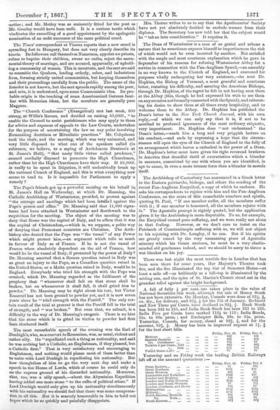The Pope's friends got up a powerful meeting on his
behalf irk St. James's Hall on Wednesday, at which Dr. Manning, the Catholic Archbishop of Westminster, presided, to protest against -" the outrage and sacrilege which had been levelle 1 against the Tope's person and office." Dr. Manning said that 11,000 signa- tures had been attached in Westminster and Southwark to the xequisition for the meeting. The object of the meeting was to 'deny that Rome was the capital of Italy, and to affirm that it was the capital of Christendom,—which is, we suppose, a polite way -of denying that Protestant countries are Christian. The Arch- 'bishop also denied that the Pope was "the vassal" of any Power which might protect hitn,—an argument which tells as much in favour of Italy as of France. If he is not the vassal of France when absolutely dependent on the aid of France, how would he be the vassal of Italy, if protected by the power of Italy? Dr. Maiming asserted that a Roman question raised in Italy was -as great an injury to the Pope, as a Canadian question raised in the United States, or a Malta question raised in Italy, would be to England. Everybody who tried his strength with the Pope was .crushed, which Dr. Manning regarded as the fulfilment of the prophecy that "whosoever shall fall on that stone shall be broken, but on whomsoever it shall fall, it shall grind him to powder." Dr. Manning may be right about his text, but Victor Emanuel has not been ground to powder yet, and it is now seven years since he "tried strength with the Pontiff." The only cer- tain result of the trial at present is that the Pontiff fell in the trial of strength, and "was broken." But even that, we submit, is a difficulty in the way of Dr. Manning's exegesis. There is no hint that the stone which is to grind its victim to powder had first -been shattered itself.


































 Previous page
Previous page